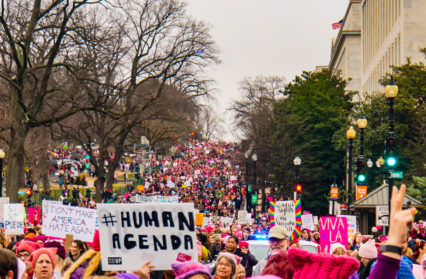In the third of a series of interviews marking a year since the first global Women’s March, author and Guardian journalist Rhiannon Lucy Cosslett talks to Cerith Mathias about power imbalances that still exist within the workplace, the importance of campaigns such as ending period poverty and listening to the sage advice of her grandma.
Cerith Mathias: You took part in the first Women’s March in London last year, has much progress been made in highlighting the issues that the march sought to address?
 Rhiannon Lucy Cosslett: I think in terms of highlighting, a lot. Especially, it almost goes without saying, sexual harassment and abuse. Though I think we could do more to highlight how this affects women in low paid work as well, from restaurants to cleaning jobs to retail. Feminism must include class in its discussion of inequality. So, I hope 2018 will see more working-class women’s voices joining the #MeToo movement. Employment instability, such as casual, low-paid work and zero-hours contracts facilitates sexual harassment. And it is women who are generally in these jobs.
Rhiannon Lucy Cosslett: I think in terms of highlighting, a lot. Especially, it almost goes without saying, sexual harassment and abuse. Though I think we could do more to highlight how this affects women in low paid work as well, from restaurants to cleaning jobs to retail. Feminism must include class in its discussion of inequality. So, I hope 2018 will see more working-class women’s voices joining the #MeToo movement. Employment instability, such as casual, low-paid work and zero-hours contracts facilitates sexual harassment. And it is women who are generally in these jobs.
Last year’s Women’s March was incredible in its diversity, and that was great to see. Not just all kinds of women but also men and children, too. I think Trump’s election was a watershed moment for a lot of people. It made you realise that you can’t just sit back and accept inevitable progress. That kind of progress has to be fought for and won.
The headlines have been dominated this week by outrage over the President’s Club Dinner – a men-only charity event where waitresses were allegedly harassed and groped. There are some who say it was only ‘harmless fun’ and the backlash has been ‘puritanical,’ What do you think it says about the work still to be done to change attitudes and culture on wider issues of women’s equality?
It says that we have a really long way to go. In Victorian times it was fairly common for the master of the house to go below stairs and harass and abuse and even rape the female servants. It shows the same thing is going on and that actually rich men are some of the worst offenders. If anything, this shows that class is a fundamental consideration for any feminist and that rich powerful men still get away with abusing women with relatively little punishment, to the point where it is a leisure activity for them. The whole thing is sickening.
Do campaigns such as #MeToo and #TimesUp help the situation? Are women feeling more encouraged and supported when speaking out about these kinds of experiences?
In general, definitely. But if we are talking about work-specific sexual harassment then it really depends on your HR department. It does seem as though a lot more companies are taking these allegations seriously. It’s not just about speaking out, it’s about the power imbalances that continue to exist in the workplace, in ways that often do not favour women. If you have a work environment where, say, many senior positions are occupied by older men and many junior positions are occupied by young women in very unstable employment then sadly there are going to be men who will be keen to take advantage of that imbalance. That is why, as well as “raising awareness”, feminists must also campaign for equal pay for equal work, for equal representation in the workplace, and for secure, long term employment for women that comes with employment rights. This is why unions are so important – though to be honest with you they are not immune from dinosaurs either, but things are changing. I think we all know by this point that the pay gap can’t simply be blamed on women being too shy to ask for more money, and that women’s careers still tend to be the ones that suffer when they have children. What the hell happened to creches, for instance? There is still a long way to go.
The #MeToo campaign in particular has been criticised by some for a lack of nuance in dealing with difficult experiences. Actor Catherine Deneuve, along with around 100 other French performers, writers and academics penned an open letter stating a post-Weinstein ‘witch-hunt’ threatens sexual freedom, while others, such as Germaine Greer have said that women are simply ‘whingeing.’ What do you make of these criticisms?
Complete and utter bollocks, to be quite frank. Why do we persist in listening to Greer particularly? She has hardly shown herself to be interested in the kind of collective, co-operative feminism that most of us seek, and has a proven track record of nastiness towards other women and contrarianism for the sake of it. Sometimes I wonder how much Germaine Greer actually likes women. I wonder if she is losing her marbles or is actively attempting to undermine modern feminism. Her contribution to feminism has been important, but her usefulness to the movement these days is debatable. As for Deneuve, well, it just goes to show that women can be sexist too. We are all products of our environments, and the one in which she was raised was hardly progressive. You can internalise these things.
I’m actually feeling sorry for older women at the moment, because the only ones who seem to be grabbing headlines are the ones who are crotchety and reactionary, when actually a lot of older women have always said that sexual harassment is bullshit and been supportive of my generation. Women like my grandma, who is in her eighties. Why should she be judged by these stupid comments? Someone should go and interview her.
This year marks the centenary of partial suffrage in the UK. Women’s rights have come a long way in the past 100 years, but what are the changes you’d like to see happen in 2018?
I want to see buffer zones brought in to protect abortion clinics from harassment from religious cult protesters who wait outside and bully patients. It’s already happening in Ealing, but should be nationwide. I’d like to see the success of Amika George’s period poverty campaign, to get free sanitary products to girls on free school meals. An end to the government austerity that so disproportionately affects women, for example with the closure of domestic violence refuges, which is actually killing women. In terms of domestic violence, the media could do much to improve its coverage. Indeed its coverage of women’s issues generally. In Ireland, I’d like to see abortion legalised, finally. And I’d love it if Trump went, somehow. Am I asking too much?
Rhiannon Lucy Cosslett is an author and regular columnist for The Guardian.











